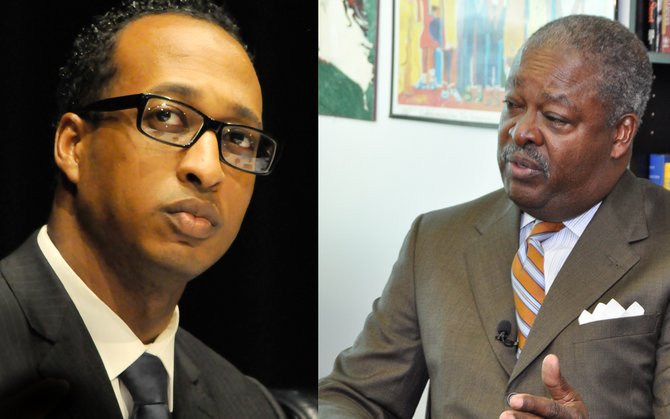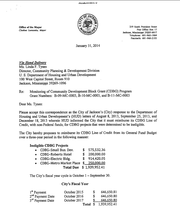City Council President Melvin Priester Jr. and several candidates running for mayor of Jackson are lambasting the administration of former Mayor Harvey Johnson Jr. over the mishandling of federal block grants. Johnson, also running for the seat, defends his record. Photo by Trip Burns.
An agreement between the city of Jackson and a federal housing agency over the apparent mishandling of $2 million in community-development block grant money could hamstring small development in the capital city for the next three years and has emerged as a hot issue in the special election for mayor.
"The federal government came down and slammed us," Melvin Priester Jr., who is running for mayor and represents Ward 2 on the city council, told the Jackson Free Press editorial board March 24.
Priester, who has also served as council president since the death of Mayor Chokwe Lumumba in late February, provided the JFP with documents from city officials responding to a U.S. Department of Housing and urban Development monitoring report stating that the city allocated $1.9 million in CDBG money that failed to meet federal guidelines.
The ineligible CDBG projects included $575,532 for small-business development, $200,000 for the Roberts Hotel, $914,420 for the Electric Building and $250,000 for Metro Market Place, according a letter from HUD dated Jan. 31, 2014, and signed by Lumumba.
As a result, the city has also suspended its CDBG small-business grant program, Priester said, "because people were being given money without any sort of accountability with regard to whether they qualified for the money (or) whether they were doing the sorts of things they were supposed to do with the money." In addition, the city "had to let go a number of people," Priester said, although he declined to name specific individuals.
Ward 4 Councilman De'Keither Stamps, who accompanied Priester to a briefing on the status of all HUD programs, called cleaning up the problem a "huge issue."
"It doesn't get any bigger," Stamps said, adding that the city council is implementing budgeting policies to keep the mistakes from happening in the future.
Priester lays blame for the debacle at the feet of former Mayor Harvey Johnson Jr. as an example of Johnson's administration negligence to detail that he, Priester, vows to change if he is elected mayor.
Johnson defended his administration's handling of the HUD money in a separate interview with JFP editors March 31.
"I think a lot of the issue is the city's view of how funds should be expended, and HUD's view of how funds should be expended," said Johnson, who added that some of the funds in question were spent during the Frank Melton administration, between 2005 and 2009.
Johnson said the city encountered a "glitch" with a program it implemented to match up to $20,000 for improving business facades, but did not comply with HUD rules.
Besides, Johnson said, the grants were reimbursements that the city council approved. "There was ample opportunity for sunshine to come through the process," Johnson said.
Under the agreement the council and Lumumba made with HUD, Jackson will pay about $646,650 each year from its general fund over the next three fiscal years until the debt is settled; the city council could have had the money deducted from next year's allocation, but doing so would result in a permanent reduction by the amount owed, Priester said.
"(T)he city's economic downturn of past years have grossly affected the city of Jackson by reducing the amount of financial resources available to the city to provide the basic municipal services to its citizens," Mayor Lumumba wrote in his letter to HUD officials.
Priester characterizes the episode as a need for the next mayor to pay closer attention to detail. Johnson countered to say his administration handled approximately $100 million in HUD grants during his three terms as Jackson mayor. Stamps maintains that the $1.9 million the city is paying is not insignificant.
"Either you do it right, or you do it wrong," Stamps said. "When handling public funds, there's zero margin for error."




Comments